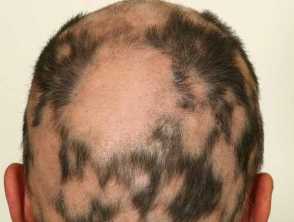- Acne
- Actinic Keratosis
- Aesthetics
- Alopecia
- Atopic Dermatitis
- Buy-and-Bill
- COVID-19
- Case-Based Roundtable
- Chronic Hand Eczema
- Chronic Spontaneous Urticaria
- Drug Watch
- Eczema
- General Dermatology
- Hidradenitis Suppurativa
- Melasma
- NP and PA
- Pediatric Dermatology
- Pigmentary Disorders
- Practice Management
- Precision Medicine and Biologics
- Prurigo Nodularis
- Psoriasis
- Psoriatic Arthritis
- Rare Disease
- Rosacea
- Skin Cancer
- Vitiligo
- Wound Care
News
Article
Integrated Data From BRAVE-AA1 and BRAVE-AA2 Trials Supports Efficacy of Baricitinib Over 104 Weeks in Alopecia Areata
Author(s):
Long-term treatment showed increased efficacy in patients who responded partially in week 52, indicating the importance of extended therapy for maximizing benefits in certain individuals.
Integrated data from the BRAVE-AA1 (NCT03570749) and BRAVE-AA2 (NCT03899259) trials were recently published in the Journal of the European Academy of Dermatology and Venereology and demonstrated the efficacy and safety of baricitinib in patients with severe alopecia areata (AA) over a 104-week duration.1
Baricitinib is the first systemic treatment approved for adults with severe AA. It has already demonstrated efficacy in scalp, eyebrow, and eyelash hair growth, with growth rates continuing to improve over the course of 52 weeks.2-3 "While there are limited long-term data on JAK inhibitors for AA, Week-52 results from BRAVE-AA1 and BRAVE-AA2 suggest that long-term therapy for severe AA may be required to observe maximum benefit and maintain clinical response," according to authors Senna et al.1
In order to evaluate baricitinib over a long-term duration, researchers utilized integrated data from BRAVE-AA1 and BRAVE-AA2 to evaluate its efficacy in patients with AA who were treated with the same continuous dose over a 104-week period.
BRAVE-AA1 and BRAVE-AA2 are ongoing trials aimed at assessing the efficacy and safety of baricitinib for AA. These studies are double-blind, parallel-group, and placebo-controlled. Eligible participants, as outlined in previously published trial protocols, are adults experiencing AA episodes lasting between 6 months to 8 years, with Severity of Alopecia Tool (SALT) scores ≥50, or significant scalp hair loss.
The efficacy analysis primarily focused on patients initially randomized to receive either baricitinib 2 mg or 4 mg, who then maintained the same dose for 104 weeks. This included patients who achieved a SALT score ≤20 at week 52 and continued with their current dosage.
For those with a SALT score >20 at week 52, efficacy analyses extended to patients continuously treated with baricitinib 4 mg since baseline and who maintained this dosage up to at least week 76, given that they met certain criteria for eyebrow and/or eyelash regrowth or achieved a SALT score ≤20.
Results indicated a maintenance of efficacy among week-52 responders, with the majority maintaining SALT scores ≤20 and achieving significant improvements in hair regrowth and quality of life measures at week 104. Both the 2 mg and 4 mg dosage groups exhibited sustained improvements in anxiety and depression scores throughout the study period.
For week-52 mixed responders, who had more severe disease characteristics at baseline, there was notable improvement over time, though to a lesser extent compared to week-52 responders. Despite this, significant proportions of patients achieved clinically meaningful outcomes and experienced enhancements in quality of life indicators by week 104.
No new safety signals were observed or reported.
"As severe AA is a chronic and frequently relapsing condition, long-term therapy may be necessary for disease control. JAK inhibitors represent an important progress in AA management, but long-term data in AA remain scarce," wrote Senna et al.1 "We report the efficacy and safety over 104 weeks of continuous baricitinib treatment, showing cumulative benefit on hair regrowth and improved quality of life among Week-52 responders and mixed responders. There were few discontinuations and no new safety signals over the long-term observation period. BRAVE-AA1 and BRAVE-AA2 are ongoing and will follow patients for up to 200 weeks."
References
- Senna M, Mostaghimi A, Ohyama R, et al. Long-term efficacy and safety of baricitinib in patients with severe alopecia areata: 104-week results from BRAVE-AA1 and BRAVE-AA2. J Eur Acad Dermatol Venereol. February 23, 2024. Accessed February 26, 2024. https://doi.org/10.1111/jdv.19665
- King B, Ohyama M, Kwon O, Zlotogorski A, Ko J, Mesinkovska NA, et al. Two phase 3 trials of baricitinib for alopecia areata. N Engl J Med. 2022; 386: 1687–1699.
- Kwon O, Senna MM, Sinclair R, Ito T, Dutronc Y, Lin C, et al. Efficacy and safety of baricitinib in patients with severe alopecia areata over 52 weeks of continuous therapy in two phase III trials (BRAVE-AA1 and BRAVE-AA2). Am J Clin Dermatol. 2023; 24: 443–451.
Newsletter
Like what you’re reading? Subscribe to Dermatology Times for weekly updates on therapies, innovations, and real-world practice tips.















